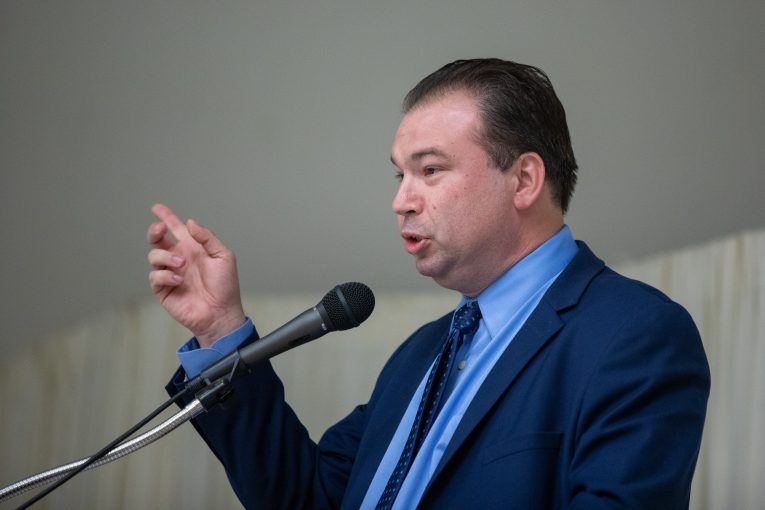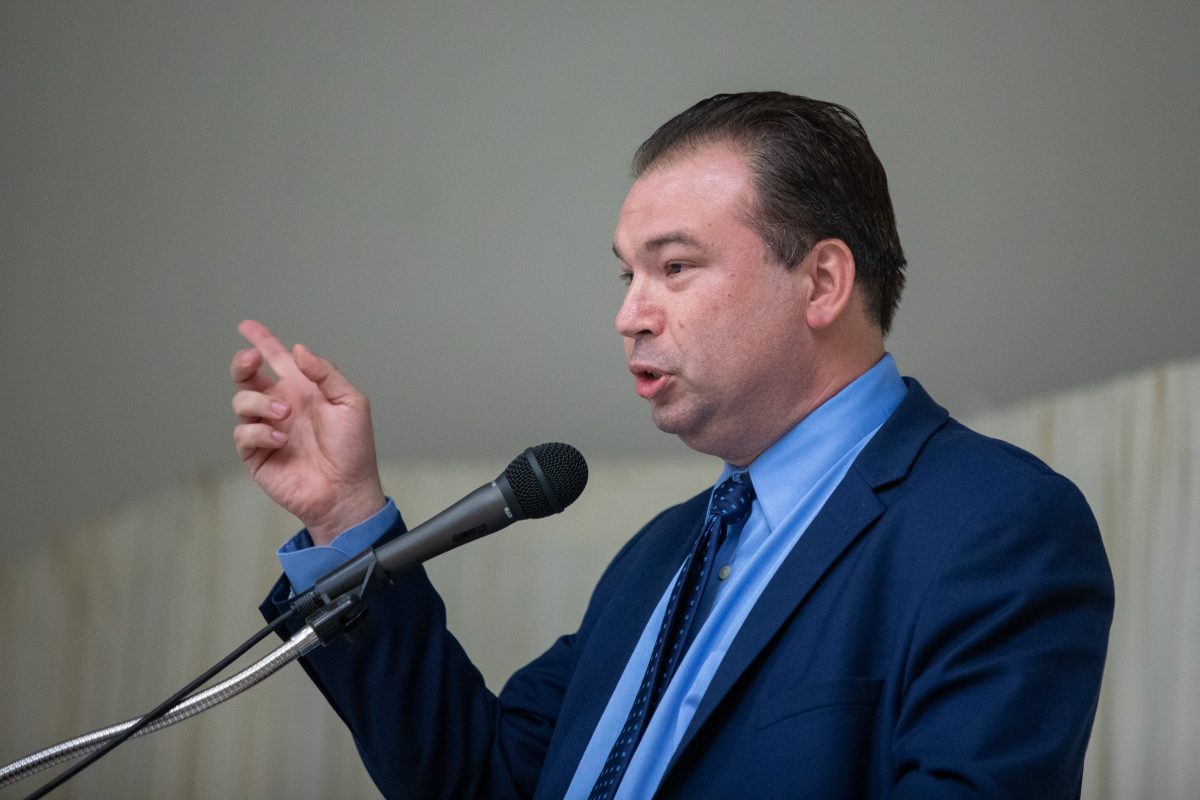

By Jeffrey Deskovic
“Looking back” will feature reprints of articles that Jeff previously wrote while a columnist at The Westchester Guardian, which encompass topics that are applicable here in CA as well as across the country and not simply applicable to NY.
As an anti-wrongful conviction advocate, I do my best to keep up with current events in the field. That information includes exonerations, developments, discoveries, and updates with respect to the causes of wrongful convictions, efforts to obtain legislative changes to make the system more accurate, information about the death penalty, and sometimes even wrongful conviction cases that are still in progress, such as my recent article questioning the Fernando Bermudez conviction prior to its being dismissed. In addition to receiving Google Alerts on wrongful convictions and exonerations, I also look over various relevant websites, subscribe to blogs, and receive list services.
6) Michael Toney, Texas Conviction: 1999. Charges Dismissed: 2009. Toney was released from jail on September 2, 2009, after the state dropped all charges against him for a 1985 bombing that killed three people. “The Texas Court of Criminal Appeals overturned Toney’s conviction on December 17, 2008, because the prosecution had suppressed evidence relating to the credibility of its only two witnesses. “The Tarrant County District Attorney’s Office subsequently withdrew from the case based on the misconduct findings.
In September 2009, the Attorney General’s Office, which had been specially appointed to the case in the wake of Tarrant County’s withdrawal, dismissed the indictment against Toney. He had consistently maintained his innocence. The case had gone unsolved for 14 years until a jail inmate told authorities that Toney had confessed to the crime. The inmate later recanted his story, saying he had hoped to win early release. The state said it is continuing its investigation into the murders. Toney was killed in an automobile accident one month after his release. The state said it is continuing its investigation into the murders.
7, 8) Yancy Douglas and Paris Powell, who were convicted in Oklahoma in 1995 (Douglas) and 1997 (Powell). Charges Dismissed: 2009. Oklahoma District Attorney David Prater dropped charges against Yancy Douglas, 35, and Paris Powell, 36, after deciding the state’s key witness was unreliable
“Ethically, and on my duty, I could not proceed in this case and had to dismiss it,” Prater said. Derrick Smith, a rival gang member to the defendants and the state’s main witness, was one of the apparent targets in the shooting. A federal appeals court in 2006 found that Smith had received a deal from the prosecutors that was not revealed to the defense and overturned the conviction of Powell but denied relief to Douglas.
Smith testified against Powell and Douglas in their separate trials, but later admitted he never saw who shot him, that he was drunk and high that night, and that he testified only because prosecutors had threatened him with more prison time.
The U.S. Court of Appeals for the 10th Circuit reviewed the District Court’s findings in 2009. With respect to Mr. Powell, the Circuit Court affirmed the lower court, stating that “we agree with the district court that Mr. Powell’s trial did not yield a verdict worthy of confidence.” With respect to Mr. Douglas, the Circuit Court held, “Assessing the prosecutor’s egregious conduct in light of the trial record leaves us with grave doubt about the validity of the jury’s verdict and persuades us that Mr. Douglas is entitled to habeas relief from his capital murder conviction.”
At the time of their release, the District Attorney added, “We all came to the opinion that without Derrick Smith, we did not have a case we could prove beyond a reasonable doubt.”
Jack Fisher, Powell’s attorney, said his client has always maintained his innocence and that Powell’s release is “bittersweet. It should have happened a long time ago. It’s unfortunate that he had to spend 16 years of his life in jail. What it boils down to is they had no evidence he was guilty. The testimony that they used to convict him was false.”
9) Robert Springsteen. 2001, Charges dismissed: 2009. On October 28, 2009, Travis County, Texas, prosecutors moved to dismiss all charges against Michael Scott and Robert Springsteen, who had been convicted of the murder of four teens in an Austin yogurt shop in 1991. (Springsteen was convicted in 2001; Scott in 2002.) Springsteen had been sentenced to death and Scott was sentenced to life in prison. The convictions of both men were overturned by the Texas Court of Criminal Appeals because they had not been adequately allowed to cross-examine each other.
State District Judge Mike Lynch had released the defendants on bond in June, pending a possible retrial by the state. However, sophisticated DNA analysis of evidence from the crime scene did not match either defendant and the prosecution announced it was not prepared to go to trial.
The judge accepted the state’s motion to dismiss all charges. Prosecutors are still trying to match the DNA from crime with a new defendant. “This has been a long time coming,” said Scott, once charges were dropped, “and I’m happy to be here.” Both Scott and Springsteen implicated themselves at the time of their arrest, eight years after the crime. However, both claimed that their statements had been coerced by police. The police investigation had been compromised from the start because the building had been set on fire, and thousands of gallons of water were poured on the crime scene before an investigation was carried out.
My Thoughts
After reflecting on the information in the email, there are a number of thoughts that entered my mind, as I reflected on various things that we all should be thankful for, which were denied to the men while on death row prior to being cleared, and which continue to be denied to other wrongfully convicted death row prisoners as well as non-death row wrongfully convicted prisoners.
Many of the items that I will mention are taken for granted, and often overlooked. We should not feel too secure: after all, anyone of us could, at any time, be wrongfully convicted. Keep in mind all that that would entail, in terms of what you would not able to do, while thinking about the following things:
Be thankful for the ability to breathe, as opposed to having it challenged by a court decision.
Be thankful for the ability to gather around family members or friends, enjoying their company and perhaps a meal, as opposed to the isolation of prison and often being sent to far away locations that makes family visitation difficult, if not impossible.
Be thankful for the ability to walk around as you will, and to otherwise have the freedom of movement, as opposed to being confined to a cell, and being allowed outside of it only during certain times and to certain areas, all of which are in a prison.
Be thankful for the ability to use the phone when you want to, for as long as you would like instead of only being allowed to make collect calls during limited periods of time, and then only if the line to use the limited number of phones is not too long.
Be thankful for the ability to access the news, pick up a newspaper or magazine, access information and books relatively easily, as opposed to how limited the information is that prisoners have access to, and the difficulty it takes even to get the information that is there.
Be thankful for the ability to go to a grocery store, as opposed to being allowed to buy very limited food items once every couple of weeks, with many items not even being sold, and some even being considered to be illegal.
Be thankful for the ability to visit gravesites of deceased people, as opposed to never being allowed to do so.
Be thankful that you have the ability to turn on a television in your house, as opposed to how in many facilities televisions inside of the cells are not allowed, and how the televisions in the recreational area are set to a specific channel that is not to be changed, lest one risk danger.
Be thankful for the ability to choose one’s life direction, as opposed to the limitations on that while in prison.
Be thankful for the ability to wear whatever clothes you choose, provided that you can afford it or it is given as a gift, whereas in prison many clothing items are banned, some colors are not allowed, and a series of seemingly senseless rules, such as clothing items having to be one solid color rather than mixed colors, are enforced.
Be thankful for your ability to use a computer, and to send and receive emails.
Be thankful for the ability to open a window.
Be thankful for being able to know what time it is, as opposed to frequently not knowing and having to rely on external signs, that are sometimes but not always available.
Be thankful for access to a fan or air conditioning in the summer, and to heat in the winter, as opposed to being in a cell which is either really cold in the winter or extremely hot in the summer, due to the cell bars absorbing the heat from the sun so that it is really hot even after midnight.
Be thankful for having privacy when using the bathroom, as opposed to having no door to close when using the toilet in a cell.
Be thankful that the price for visiting family or friends is not that you have to submit to a strip frisk.
Be thankful that neither your life, nor that of your family and loved ones, nor your friends, has been disrupted by a wrongful conviction. And then remember that, for many other people, it has.
“Jeffrey Deskovic, Esq, MA, is an internationally recognized wrongful conviction expert and founder of The Jeffrey Deskovic Foundation for Justice, which has freed 9 wrongfully convicted people and helped pass 3 laws aimed at preventing wrongful conviction. Jeff is an advisory board member of It Could Happen To You, which has chapters in CA, NY, and PA. He serves on the Global Advisory Council for Restorative Justice International, and is a sometimes co-host and co-producer of the show, “360 Degrees of Success.” Jeff was exonerated after 16 years in prison-from age 17-32- before DNA exonerated him and identified the actual perpetrator. A short documentary about his life is entitled “Conviction“, and episode 1 of his story in Virtual Reality is called, “Once Upon A Time In Peekskill“. Jeff has a Masters Degree from the John Jay College of Criminal Justice, with his thesis written on wrongful conviction causes and reforms needed to address them, and a law degree from the Elisabeth Haub School of Law at Pace University. Jeff is now a practicing attorney.
